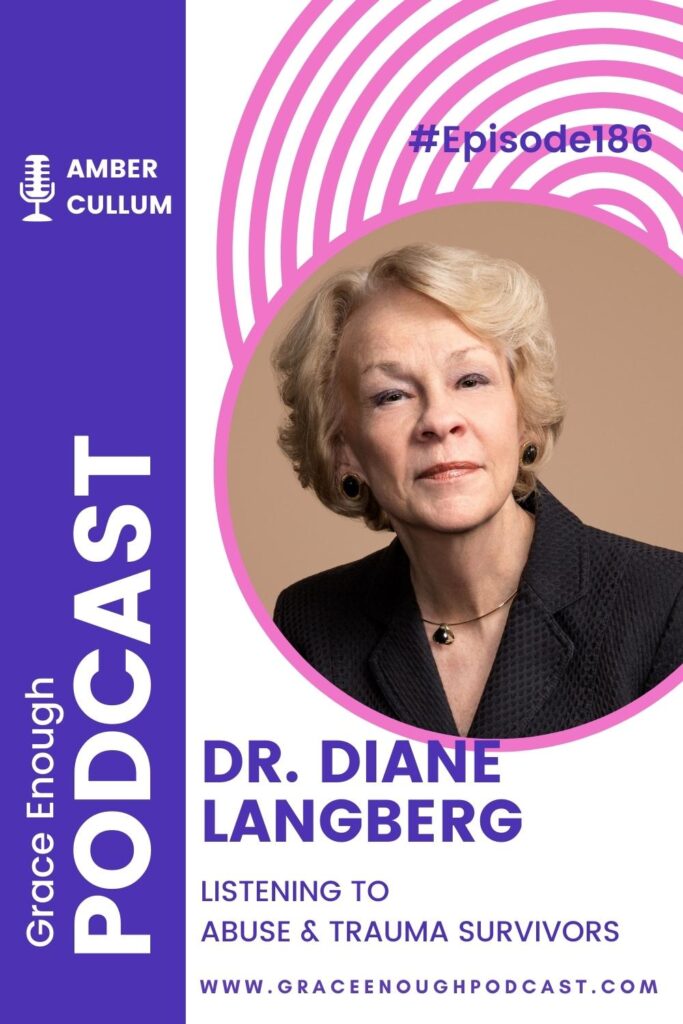186: Dr. Diane Langberg | Listening To Abuse and Trauma Survivors

Dr. Diane Langberg | Listening To Abuse and Trauma Survivors
Dr. Diane Langberg is a psychologist globally recognized for her 50 years of clinical work with trauma victims. She has trained caregivers and clergy on six continents in responding to trauma and to the abuse of power.
She was the director of Diane Langberg, Ph.D. & Associates, a group practice in Jenkintown, PA. She has since stepped down from that role and the practice, which includes seventeen therapists with multiple specialties, is now run by Dr. Phil Monroe.
She is the author of Counsel for Pastors’ Wives (Zondervan), Counseling Survivors of Sexual Abuse (Xulon Press), and On the Threshold of Hope: Opening the Door to Healing for Survivors of Sexual Abuse (Tyndale House) and Suffering and the Heart of God: How Trauma Destroys and Christ Restores (New Growth Press). Her newest book is Redeeming Power: Understanding Authority and Abuse in the Church. Dr. Langberg is also a columnist for Christian Counseling Today and contributes to many other publications.
Dr. Diane Langberg and Amber discuss how her 50 year career working with trauma and abuse victims began, the similarity she encountered between veterans of war and abused women, the current reckoning of power abuse in the church, and pastors as shepherds.
Listening To Abuse and Trauma Survivors Questions Discussed:
- (3:20) Your career as a Christian psychologist began 50 years ago. And for those who are not familiar with your work, would you share your experience with your supervisor years ago who advised you not to listen to a woman who said, “My father did weird things to me”?
- (7:07) You began listening to the trauma and PTSD women and veterans were experiencing long before the term was used and the diagnosis existed. What were those first 10-20 years like?
- (8:38) What are some of the biggest lessons you’ve learned about treating people who have been abused? Have PTSD? Survivors?
- (10:10) Not only has your work included women and veterans, but pastors, leaders around the world. What have you learned about abuse and trauma on a global scale?
- (13:27) There were decades where pastors, clergy, church leaders who were accused of sexual abuse would have been referred to as having an affair Why is that not an appropriate term to use when pastor, clergy, youth leader, church leader has a sexual encounter with someone in their care? Why is that abuse vs. an affair?
- (19:08) Do you think the current rise in church abuse is just a trend or a genuine problem you see in our churches? Are people jumping on the #metoo, #churchtoo movement and it will fade?
- (22:54) How can you tell in a he said, she said situation who is the victim and who is the abuser?
- (26:05) What type of work does G.R.A.C.E. do? How are they helping promote healthy and safe environments in our churches?
- (29:10) As we close, what do you see as the day in, day out way to move forward, free and unified in Christ?
Quotes From Listening To Abuse and Trauma Survivors:
“The woman I just spoke about was in 1972, post traumatic stress disorder was not even a diagnostic category until 1980. So what I realized was that the soldiers and the women had the same symptoms. And so I figured there was more than one kind of war zone in the world.”
“Part of what I learned from them [survivors] is that to talk about such things, takes tremendous courage.”
“I’ve learned that people go at their own pace…partly because everybody’s unique and partly because the abuse is not a cookie cutter thing.”
“I’ve worked with pastors and their wives for a long time, and then ended up with a case where the pastor was wounded and abusing. My worlds crashed together. That was hard.”
“Shepherds, don’t commit adultery with their sheep.”
“When Jesus said, Feed my sheep, he didn’t say exploit them.”
“We have minimized the level of deception required to feed ON the sheep….[When] we’re saying, ‘Okay, well, he said, he’s sorry, he cried, we forgive him. Let’s go back to normal.’ We’re actually doing damage to the shepherd as well….We leave them in that prison, we leave them in those deceptions. That’s not love.”
“There is a way forward and I think that the exposure of all of this, especially the stuff in the news by these people that we thought were so wonderful…it’s God’s exposure.”
“I think we need to recognize what is happening is a call from God to us. We follow a wounded savior. We don’t want to be around the wounded. It can be difficult, they’re change is slow, they’re afraid. They have to hear bad things….[B]ut we follow a wounded savior and he very clearly told us to pursue and bless the least of these. “
“The way Christians are talking to each other today is breaking the heart of our God.”
Resources Mentioned:
- netgrace.org
- FREE Spiritual Hurt Resource page
- Book: Redeeming Power: Understanding Authority and Abuse in the Church by Dr. Diane Langberg
Related Episodes:



Recent Posts
-
256: You’ve Accepted Jesus, But Do You Know Him? | Shane StanfordApril 22, 2024/0 Comments
-
254: Allyson Golden | Light in the DarknessApril 8, 2024/
-
253: Are You Secure in God’s Embrace? | Cheryl LutzMarch 26, 2024/
-
252: What Did Jesus Actually Finish? | Charles MartinMarch 19, 2024/